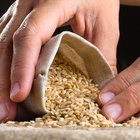
locrifa/iStock/Getty Images
Eating at least the recommended amount of whole grains may help lower your risk for health conditions such as cancer, heart disease, diabetes and obesity, according to an article published in "The Journal of Nutrition" in March 2011. Whole grains also provide more essential vitamins and minerals than refined grains, notes the Academy of Nutrition and Dietetics.
Recommended Intake
The U.S. Department of Agriculture recommends that half of the grains you eat consist of whole grains. This means women should eat at least three 1-ounce servings of whole grains per day, and men should eat three to four servings. A serving is equal to 3 cups of popped popcorn; 1/2 cup of cooked oatmeal, whole-wheat pasta or brown rice; a regular slice of whole-wheat bread; a cup of whole-grain breakfast cereal; a 6-inch whole-wheat tortilla; or half of a whole-wheat English muffin or mini bagel.
Related Articles

Are Corn Pops Healthy?

Is Hominy Grits a Good Source of Fiber?

How Much Brown Rice Can a Woman Eat a ...

How to Respond to a Compliment From a ...

How to Make Toasted Bread Sticks With ...

How to Freeze Empanadas

Nutrition Information on Blueberries

Fiber in Soybeans
Calories in a Cucumber and Avocado Roll

The Carbohydrates in Blueberries

How to Make Fresh Strawberry Frosting ...

How to Blanch Tomatillos

How Long Does It Take to Cook Linguine?

How Many Calories Are in 1/4 Cup of ...
Calories in Candied Walnuts

Does It Take Longer to Cook With the ...

How to Bake Mac & Cheese With a Bread ...

How to Make Really Good Lemonade

How Long Do You Cook Whole Deer ...

The Calories in Costco's Gourmet ...
References
Writer Bio
Based in Massachusetts, Jessica Bruso has been writing since 2008. She holds a master of science degree in food policy and applied nutrition and a bachelor of arts degree in international relations, both from Tufts University.
Photo Credits
locrifa/iStock/Getty Images